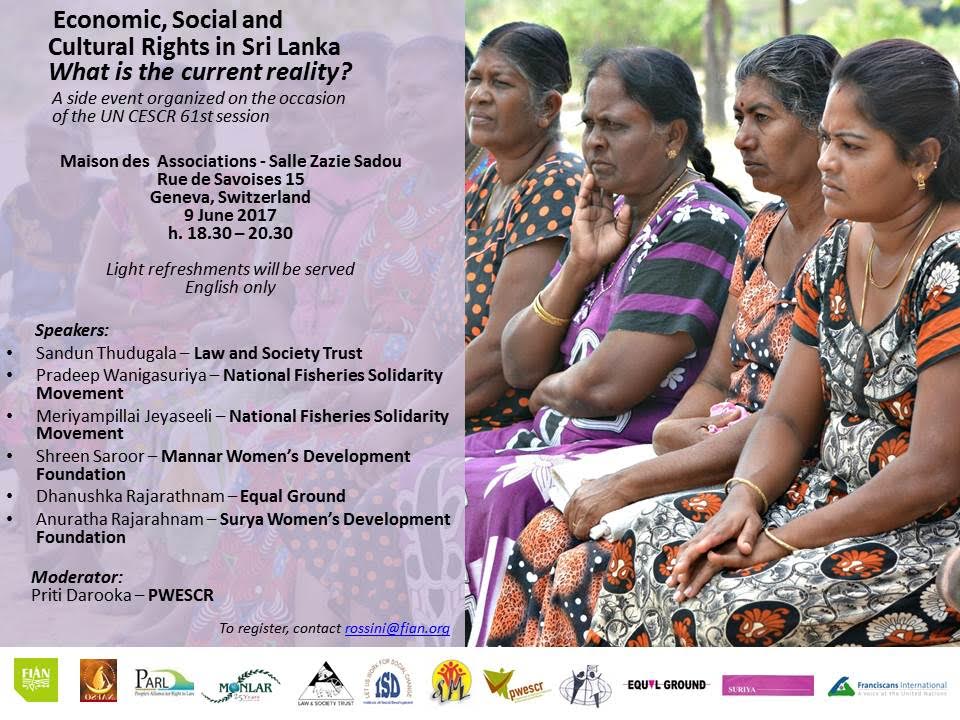Invitation Image: A public discussion will be held on ESC rights situation in Sri Lanka tomorrow.
Incorporating ICESCR into Domestic Law
- HRCSL recognizes the imperative need to address the following Concluding Observation of CESCR (2010):
The Committee calls upon the State party to ensure that the Covenant enjoys full legal effects in the domestic legal order and prevails over domestic legislation in case of conflict. It also urges the State party to bring its domestic legislation in conformity with the rights contained in the Covenant. The Committee calls upon the State party to improve human rights training programmes in such a way as to ensure better knowledge, awareness and application of the Covenant and other international human rights instruments, in particular among the judiciary, law enforcement officials and other actors responsible for the implementation of the Covenant.
- HRCSL is of the view that the ongoing constitutional reform process taking place in Sri Lanka at present is an opportune moment to adopt a comprehensive Bill of Rights. Sri Lanka has a dualist legal system and has to incorporate international human rights standards via domestic legislation. The currently operative 1978 Constitution of Sri Lanka privileges civil and political rights over ESC rights. At present most economic and social rights are confined to the non-justiciable Directive Principles of State Policy (Chapter VI of Constitution).
- The unique public representations process adopted by the current constitutional reform process reported on the public demand to have economic and social rights such as the right to education and health care enshrined in a future constitution.[1] However, a small but politically influential group has commenced an active campaign to discourage the incorporation of ESC rights as justiciable rights in the constitution, mainly on the basis that ESC rights have resource implications and an unelected judiciary should not be left to decide such issues.[2] HRCSL is deeply concerned by such efforts that could roll back decades of work to bridge the artificial cold war inspired divide between civil and political rights and ESC rights.
- HRCSL has actively advocated the inclusion ESC rights as justiciable rights in the future Constitution of Sri Lanka. In our recommendations for constitutional reform (Annex I), the Commission endorsed an existing draft Charter of Rights that fully recognized indivisibility of rights. Further, our recommendations called for an expanded non-discrimination clause which is pivotal to the equal enjoyment of all rights including ESC rights, and also judicial review of legislation (not currently permitted).
- Additionally, HRCSL issued a public statement specifically on the need to include ESC rights as fully justiciable rights in the Constitution of Sri Lanka (Annex II). It called on the government of Sri Lanka to give leadership to recognize ESC rights as fully protected constitutional rights.
[1] Report of the Public Representations Committee on Constitutional Reform at http://www.yourconstitution.lk/PRCRpt/PRC_english_report-A4.pdf
[2] ‘Socio-economic rights in Sri Lanka’s constitution may backfire on the poor’, Economy Next, 25 February 2017 at http://www.economynext.com/Socio_economic_rights_in_Sri_Lanka_s_constitution_may_backfire_on_the_poor-3-7428.html
Read the full report as a PDF CESCR – 61st sessionINT_CESCR_NHS_LKA_27402_E
